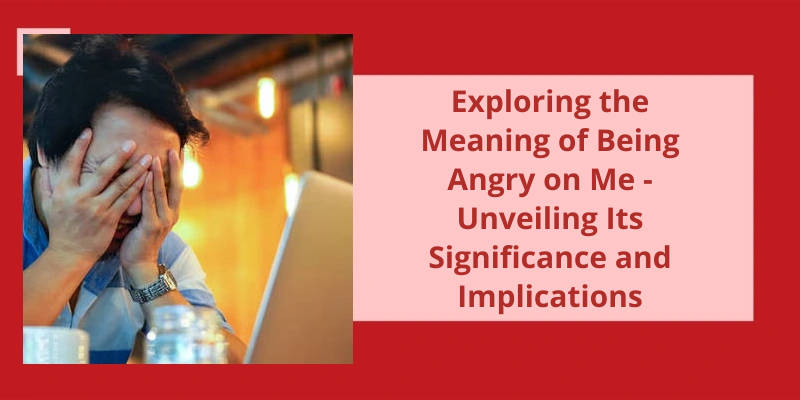Emotions are an intricate part of the human experience, shaping our thoughts, actions, and relationships. This expression suggests a state of being irritated or indignant about something or someone, a feeling that seems to emanate from within, ignited by external factors. In this article, we aim to unravel the layers of anger, understanding it’s various dimensions and shedding light on it’s implications for our well-being and relationships.
Is It Angry at or Angry on Me?
When it comes to expressing emotions, language can sometimes be tricky. One common confusion arises when we try to understand the proper usage of the word “angry” in relation to oneself. Is it correct to say “angry at me” or “angry on me”?
When we say that someone is angry at us, it implies that they harbor negative feelings towards us, possibly due to something we’ve done. It suggests a sense of blame or resentment directed towards the individual. For example, if a friend forgets to invite you to a party, you might feel angry at them for excluding you from the event.
The correct prepositions to use when expressing anger towards oneself are “at” or “with.”. It’s essential to understand the subtle differences in meaning and implications between the two phrases to ensure proper communication and clarity in interpersonal relationships.
On the other hand, when someone is angry with us, it suggests frustration and upset without necessarily assigning fault. Understanding these nuances can help us navigate conversations and emotions effectively.
How to Effectively Express Anger Without Harming Relationships
- Take deep breaths and count to 10 before speaking
- Use “I” statements to express your feelings instead of blaming others
- Practice active listening to ensure proper understanding
- Avoid name-calling or using derogatory language
- Take breaks if the conversation becomes too heated
- Express your anger in a calm and assertive manner
- Focus on finding a solution rather than escalating the situation
- Seek professional help or counseling if necessary
- Practice empathy and try to see things from the other person’s perspective
- Acknowledge and validate your emotions without allowing them to control your actions
Moving on to another contextual dilemma, we encounter the struggle of finding the right preposition to pair with the emotion of anger. While it may seem perplexing at first, there’s indeed a specific preposition that complements anger in different situations. When expressing anger towards a particular topic, one should use the preposition “about.” However, when directing anger towards a person, one can choose to use either “at” or “with.” For instance, “I’m angry about his careless attitude towards health” or “I’m angry at him for being late.”
Which Preposition Goes With Angry?
Exploring the Meaning of Being Angry on Me: Unveiling It’s Significance and Implications
The world of emotions is a complex landscape, and anger is no exception. It’s a powerful and intense feeling that can consume us, pushing us to the brink of explosive action. But amidst the chaos, it’s important to understand the nuances of anger and the prepositions that accompany it. This distinction holds the key to unraveling the true meaning of anger and it’s implications on our lives.
One context that often confuses speakers is the appropriate preposition to use with anger. The correct way to express it’s “I’m angry about” when referring to a particular topic or situation that’s infuriated us. For instance, “I’m angry about the rising crime rates in our city.”. This construction highlights our emotional reaction to a specific issue or circumstance.
On the other hand, when the focus shifts to a person rather than a topic, the prepositions “at” or “with” find their place. We say “I’m angry at” or “I’m angry with” someone, reflecting our dissatisfaction or resentment towards their actions. For example, “I’m angry at my colleague for taking credit for my work” or “I’m angry with my friend for betraying my trust.”
Understanding the appropriate prepositions not only enhances our language skills but also aids in unraveling the significance of anger in our lives. When we’re angry about something, it implies that we’re emotionally invested in it, seeking justice or resolution. This anger can motivate us to take action, to fight for what we believe is right.
Conversely, being angry at or with someone signifies a deeper personal connection. It implies a sense of hurt or betrayal, a breach of trust that’s left us feeling deeply wounded. In such cases, anger can strain relationships, breed resentment, and erode the bonds of friendship or love.
The expression of anger goes beyond mere words, extending into the intricacies of prepositions that accompany it. Therefore, being mindful of how we express and handle anger is crucial in navigating the complex terrain of our emotions.
Mad at someone/something” means being angry, furious with someone, or something. It reflects a negative emotional state and is often accompanied by feelings of resentment, annoyance, or frustration. Understanding why someone is mad at you can help improve communication and resolve conflicts in relationships.
What Is the Meaning of Mad at Me?
Exploring the meaning of being angry at myself unveils a rich tapestry of emotions and introspection. When one finds themselves mad at me, it signifies a deep-seated resentment or disappointment that emanates from within. This feeling of anger directed inward embodies self-criticism and highlights the intense personal significance that the situation holds. It delves into the complex intricacies of self-perception and the desire for personal growth and improvement.
It reveals a sense of responsibility and accountability towards ones own emotions and actions. This anger acts as a wake-up call, demanding attention and acknowledgment towards the aspects of oneself that have fallen short or caused harm. It emphasizes the importance of self-compassion and understanding, encouraging individuals to learn from their mistakes and grow emotionally.
It signifies a deep-seated anger directed inward, highlighting the significance and implications it holds. It serves as a guiding force towards personal development and the pursuit of a better version of oneself.
The Psychological Effects of Being Mad at Oneself
The psychological effects of being mad at oneself can be profound and far-reaching. When we experience anger towards ourselves, it can lead to feelings of guilt, shame, and self-disgust. These negative emotions can have a detrimental impact on our mental well-being, often resulting in low self-esteem and a diminished sense of self-worth.
Being mad at oneself can also manifest in self-destructive behaviors, such as self-sabotage or engaging in harmful coping mechanisms. This self-directed anger can create a vicious cycle, where our negative thoughts and emotions reinforce each other, making it difficult to break free from this pattern.
Moreover, the psychological effects of being mad at oneself can extend beyond the individual. It can strain relationships with others, making it challenging to form and maintain healthy connections. The internalized anger may cause us to withdraw from social interactions or push loved ones away.
Understanding the significance and implications of being angry at oneself is crucial for personal growth and well-being. It involves cultivating self-compassion, forgiveness, and learning healthier ways to cope with mistakes or failures. Seeking support from professionals, such as therapists or counselors, can also be beneficial in navigating and overcoming the psychological effects of self-directed anger.
When someone says “I’m furious at you,” it indicates that they’re experiencing intense anger or annoyance towards the person they’re addressing. This phrase conveys a sense of rage and frustration, suggesting that they’re extremely upset and their emotions are running high.
What Does I’m Furious at You Mean?
When we say “Im furious at you,” it conveys an unmistakable intensity of anger and frustration towards another person. This phrase typically signifies a heightened emotional state, encapsulating feelings of extreme anger or annoyance. It goes beyond simple irritation and reaches the realm of rage. The word “furious” itself implies a wild and uncontrollable anger, suggesting that the persons emotions have surpassed a manageable level.
Expressing such strong feelings towards someone indicates that they’ve provoked deep-seated emotions within us. This powerful reaction implies that the persons actions or words have significantly crossed our boundaries, violated our trust, or offended our values.
Being furious often leads to a surge of adrenaline, resulting in heightened agitation and a desire for immediate confrontation or resolution. In this state, rational thinking may be temporarily overshadowed by overwhelming emotion, making it crucial to approach the situation with caution. The consequences of acting upon this strong anger without careful consideration can be detrimental, leading to further damage to relationships and potential regret.
It illuminates the power dynamics within relationships and serves as a warning sign that boundaries have been violated. Exploring the reasons behind this fury can shed light on the core values and personal boundaries we hold, as well as providing an opportunity for growth and introspection. Ultimately, acknowledging and addressing our anger constructively can pave the way for personal healing, resolution, and growth.
“I’m not angry at all,” he said as he took a deep breath, attempting to maintain his composure in the midst of frustration and disappointment.
How Do You Use Not Angry in a Sentence?
In response to the situation, the individual calmly asserted, “I’m not angry at all.”. Despite the contentious circumstances, his composure remained unshaken, highlighting his ability to maintain emotional stability and restraint. Instead of succumbing to anger, he chose to approach the situation with a level-headed mindset, demonstrating a mature and rational response.
By expressing his lack of anger, he conveyed a sense of understanding and compassion, acknowledging that anger isn’t the solution to the issue at hand. He recognized the importance of seeking resolutions through peaceful means, refusing to let his emotions cloud his judgment. In doing so, he exemplified the power of self-control, displaying an insightful perspective on managing conflict.
Notably, the individuals choice to not be angry exemplified his commitment to personal growth and emotional intelligence. Rather than allowing anger to consume him, he opted for introspection and self-reflection, recognizing the detrimental impact anger can have on personal well-being. This conscious decision to not be angry exemplified his determination to cultivate a positive mindset and maintain healthy relationships.
When the individual declared, “I’m not angry at all,” he demonstrated a myriad of characteristics, such as emotional stability, empathy, self-control, personal growth, and a commitment to peaceful conflict resolution. His words not only revealed his mindset and values but also highlighted the significance and implications of choosing to not be angry.
Is It Correct That I Am Angry With You?
Exploring the Meaning of Being Angry on Me: Unveiling It’s Significance and Implications
The expression “I’m angry with you” encompasses a potent range of emotions that are unique to each individual. From frustration to resentment, anger possesses a multifaceted nature that primarily reflects a persons dissatisfaction or discontent with another. When someone exclaims this phrase, it signifies their acknowledgment and ownership of the anger they feel towards the person they’re addressing. Moreover, the grammatical correctness of this statement reaffirms that the individual is expressing their emotions genuinely and truthfully.
Anger, as an emotion, holds deep significance and implications for both the person experiencing it and the recipient. It often arises from a feeling of betrayal, disappointment, or hurt, indicating a breach in trust or expectation. By voicing their anger, individuals attempt to establish boundaries, express their displeasure, and communicate their need for resolution.
It alerts the recipient that their actions or words have deeply impacted the other person, potentially jeopardizing their relationship. Recognizing the magnitude of this statement is crucial for fostering effective communication and resolving underlying conflicts. It prompts both parties to engage in a dialogue that seeks to uncover the root causes of the anger and work towards finding a resolution that benefits all involved.
It opens the door for introspection and self-reflection, encouraging individuals to confront their emotions and examine their own behaviors. By acknowledging their anger, individuals can gain a deeper understanding of their triggers and identify potential areas for personal growth and development. Additionally, this statement paves the way for fostering empathy and compassion between the parties involved as they mutually recognize the validity of each others emotions.
The statement carries significant implications, highlighting the intensity of the situation and prompting both parties to engage in meaningful dialogue and self-reflection.
The Impact of Anger on Relationships: Examine How Anger Can Damage Relationships, Including Trust Issues, Communication Breakdowns, and the Importance of Resolution and Forgiveness.
- Anger can have a negative impact on relationships
- It can lead to trust issues between partners
- Communication breakdowns are common when anger is present
- Resolving anger and finding forgiveness is crucial for relationship health
Conclusion
While the phrase may not be commonly used in certain regions, such as the UK, it can still offer valuable insights into the nature of anger and it’s impact on personal well-being.






